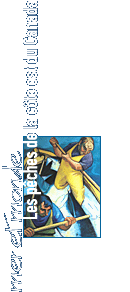Footnotes
1. KWIATOWSKA, B. The 200 Mile Exclusive Economic Zone in the New Law
of the Sea, Martinus Nijhoff Publishers, 1989, p.xxiii.
2. ECKERT, R. D. The Enclosure of Ocean Resources, Hoover Institution
Press, 1979, p.116.
3. PARSONS, S. Management of Marine Fisheries in Canada, Conseil
national de recherches du Canada, 1993, p.226.
4. United
Nations Convention on the Law of the Sea (UNCLOS), Nations Unies,
New York 1983.
5. BEESLEY, J. A. Grotius and the Pirates, mémoire
présenté au Colloquium on the Oceans de la Memorial
University 1995, p.2-3.
6. ECKERT, p.3 et p.128 et 129.
7. ECKERT, p.4.
8. Le concept du « patrimoine commun de
l'humanité » a été exposé en
public la première fois en 1967 par Arvid Pardo, ambassadeur
de l'île de Malte, à une réunion du Comité
des Nations Unies sur les fonds marins, BEESLEY, p. 5.
9. UNCLOS Article 82.
10. MITCHELL, C. L. Canada's Law of the Sea Position, The Economic
Implications, document inédit, Bibliothèque du
ministère des Pêches et Océans du Canada, Ottawa,
1974, p. 27 à 30 et p. 32.
11. PARSONS, p.228.
12. PARSONS, p.229.
13. PARSONS, p.239.
14. MITCHELL, p.30.
15. MITCHELL, p.30-31.
16. MITCHELL, p.32.
17. KWIATOWSKA, p.xx.
18. KWIATOWSKA, p.xx.
19. KWIATOWSKA, p.x.
20. MILES, E. L. Global Ocean Politics, Kluwer Law International, 1998, p.3.
21. Accord sur la pêche en haute mer : directives pour
l'application de points de référence de précaution
aux fins de la conservation et de la gestion des stocks de poissons
chevauchants et des stocks de poissons grands migrateurs, New York,
Publications de l'ONU, 1995.
22. HOEL, A. H. Performance of Exclusive Economic Zone, Dartmouth
College Hanover (New Hampshire, É.-U.), Institutional Dimensions
of Global Environmental Change. Scoping Report no. 2, juillet 2000, p. i.
|

